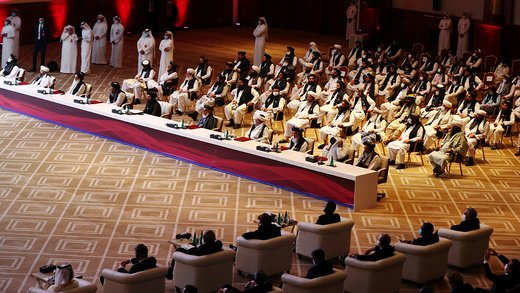Although negotiations between the Taliban and the Afghan government are historic, they are unlikely to result in a quick breakthrough.
In Qatar on Saturday, Taliban leaders and a delegation representing the Afghan government and civil society began negotiating over the future of Afghanistan. This is the first time they have convened for peace talks since the United States’ entry into the war in Afghanistan nineteen years ago.
But no one should expect a breakthrough quickly—or at all. The two sides are too far apart, and the conditions simply are not propitious to end the civil conflict that has been raging in one form or another since 1978.
How did Afghanistan get here?
Simply getting the Taliban to the table has required a series of major concessions by the U.S. and Afghan governments. In a February 29 deal [PDF] with the Taliban, the Donald J. Trump administration agreed to reduce the U.S. troop presence from 12,000 to 8,600 within a few months and to withdraw all of these forces by mid-2021. The drawdown is ahead of schedule, with Trump promising to have fewer than five thousand U.S. troops in Afghanistan by Election Day.
As part of the U.S. bargain with the Taliban, the Afghan government was forced to release five thousand Taliban prisoners—including a major narcotics trafficker and terrorists responsible for the deaths of Australian, French, and U.S. nationals. The Taliban, in turn, released one thousand government prisoners. In addition, the Taliban has refrained from killing U.S. troops, although it is believed to be responsible for rockets that were fired at U.S. bases this summer without inflicting any casualties.
Did the Taliban reduce attacks ahead of negotiations?
American negotiators had hoped that the Taliban would decrease its violence against Afghan security forces and civilians and publicly break with al-Qaeda. Neither has happened. Many of the released Taliban fighters have returned to the battlefield, and violence continues unabated. Indeed, just days before the start of intra-Afghan peace talks, Afghanistan’s senior vice president barely survived a bombing of his convoy in Kabul that killed ten bystanders. Taliban attacks are “not consistent with somebody negotiating in good faith,” General Kenneth F. McKenzie Jr., head of U.S. Central Command, said in July.
As for al-Qaeda, a May 2020 UN report found that the Taliban maintains close ties with the group. In fact, the report alleged that the Taliban consulted with al-Qaeda during its negotiations with the United States and “offered guarantees that it would honor their historical ties.” McKenzie said on Monday the Taliban has not yet “demonstrated to [his] satisfaction” that it will not “allow al-Qaeda to base [in Afghanistan].”
Will the Taliban compromise on core human rights issues?
Many Taliban fighters see the U.S. agreement as a victory for their movement and vow to keep fighting until they take over the country. “We will only accept 100 percent of power in Afghanistan,” one Taliban fighter told the Washington Post in July. Taliban negotiators have been more conciliatory in their public remarks, but so far they have shown little willingness to break with Taliban orthodoxy on critical issues such as democracy and women’s rights. When the Taliban was in power, it stoned gay people, prevented women from working or getting an education, and enforced theocratic rule under its supreme leader.
There is little reason to believe that the Taliban will now be comfortable with the compromises of a parliamentary democracy in which individual rights are guaranteed. The Taliban doesn’t even accept the legitimacy of the government in Kabul, which is why it is negotiating with a delegation that includes civil-society representatives. The Taliban has also ruled out a cease-fire while talks continue.
Given that U.S. forces will likely depart next year no matter who is president (former Vice President Joe Biden essentially agrees with Trump on this issue), the Taliban has little reason to make major concessions now. It can wait out the Americans and hope to seize power once they are gone. The conclusion of Husain Haqqani, Pakistan’s former ambassador to Washington, rings true: “The U.S. has made all the concessions and the Taliban feel victorious. It is difficult to imagine how virtually surrendering to the Taliban will bring peace to Afghanistan.”













